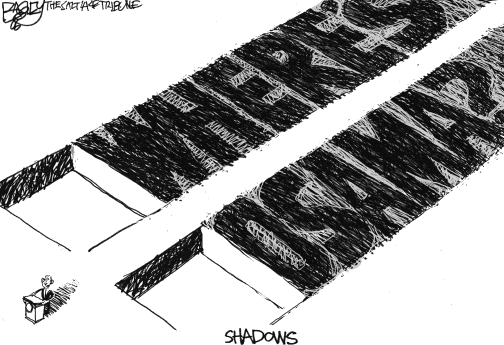Search
Democracy Links
Member's Off-site Blogs
voice of delusion .....

from the Centre for American Progress …..
Homeland Security Secretary Michael Chertoff has a "gut feeling" that the United States is at an "increased risk" of a terrorist attack this summer. But as White House officials admit, there is "no credible, specific intelligence to suggest that there is an imminent threat to the homeland." Chertoff should not be announcing terrorist threats based on his gastrointestinal murmurs. State and local officials need solid intelligence in order to properly prepare. Yet there is no doubt that the global threat of terrorism has increased since the U.S. invasion of Iraq in 2003. A new threat assessment from U.S. counterterrorism analysts concludes that al Qaeda is "considerably operationally stronger than a year ago" and has "regrouped to an extent not seen since 2001."
Chertoff's comments were swiftly attacked by both the right and the left. "Gut feeling' doesn't help any of us," said Kerry Sleeper, homeland security adviser to Vermont Gov. Jim Douglas (R). "A gut feeling is not the way to convey information to hundreds of thousands of first responders across this country that are responsible for identifying, interrupting or responding to a terrorist attack." House Homeland Security Chairman Bennie G. Thompson (D-MS) wrote to Chertoff on Wednesday and asked him to clarify his comments. "Words have power, Mr. Secretary. You must choose them wisely -- especially when they relate to the lives and security of the American public. ... What cities should be asking their law enforcement to work double shifts because of your 'gut feeling?'" Not surprisingly, Chertoff's comments were not matched by an increase in the domestic security threat level. Even White House Press Secretary Tony Snow admitted that Chertoff's "gut feeling" was nothing more than a reflection of the Homeland Security Secretary's "belief that this is a time for vigilance." Instead of simply generating anxiety, administration officials need to offer constructive steps that first responders or ordinary citizens can take.
Six years after the Sept. 11 terrorist attacks, Osama bin Laden is still on the loose. In May, U.S. News reported that he "already has a safe haven in Pakistan -- and may be stronger than ever" as al Qaeda "retains the ability to organize complex, mass-casualty attacks and inspire others." The new threat assessment by the National Counterterrorism Center is titled "Al-Qaida Better Positioned to Strike the West." John Kringen, who heads the CIA's analysis directorate, echoed the concerns of the report during testimony at a House Armed Services Committee hearing on Wednesday. Al Qaeda seems "to be fairly well settled into the safe haven and the ungoverned spaces of Pakistan," Kringen testified. "We see more training. We see more money. We see more communications. We see that activity rising."
At yesterday's press conference, President Bush claimed that "because of the actions we've taken, al Qaeda is weaker today than they would have been." But in reality, the President's policies in Iraq have increased the strength of terror networks worldwide and brought al Qaeda to Iraq. According to a Mother Jones study, "The rate of fatal terrorist attacks around the world by jihadist groups, and the number of people killed in those attacks, increased dramatically after the invasion of Iraq. Globally, there was a 607 percent rise in the average yearly incidence of attacks." Security experts believe that the tactics used in the recent London terrorist threat -- "a multiple attack using car bombs" -- were imported from Iraq. A survey of more than 100 national security and terrorism experts, conducted by the Center for American Progress and Foreign Policy magazine, and released in Feb. 2007 found that a vast majority of the experts did not believe the United States was winning the war on terror and that Americans and the United States were less safe today. The experts believed that the Iraq war was one of the fundamental reasons for the growing insecurity. Bush continues to link the 9/11 attacks with Iraq, invoking al Qaeda at least 30 times in Thursday's briefing. "The same folks that are bombing innocent people in Iraq," said Bush, "were the ones who attacked us in America on September the 11th, and that's why what happens in Iraq matters to the security here at home." But al Qaeda gained strength in Iraq only after the U.S. invasion in 2003, and "did not exist" in the country before 9/11. Al Qaeda leaders view Bush's Iraq strategy as more opportunity to launch attacks against U.S. troops. "Iraq has, of course, been an undeniable boon for al Qaeda, both as a battleground and a rallying cause," U.S. News recently reported. Additionally, while U.S. intelligence and military officials "view al Qaida in Iraq as a serious threat, they say the main source of violence and instability is an ongoing contest for power between majority Shiites and Sunnis, who dominated Saddam Hussein's regime."
- By John Richardson at 14 Jul 2007 - 8:41am
- John Richardson's blog
- Login or register to post comments
Recent comments
54 min 5 sec ago
1 hour 26 min ago
1 hour 35 min ago
2 hours 5 min ago
18 hours 5 min ago
20 hours 34 min ago
23 hours 4 min ago
1 day 2 hours ago
1 day 3 hours ago
1 day 3 hours ago